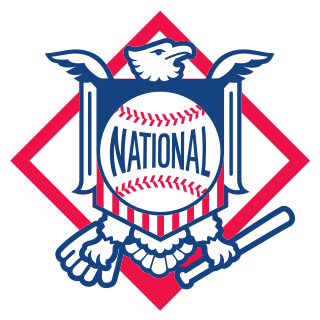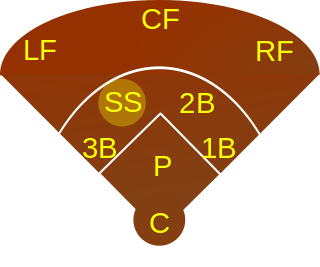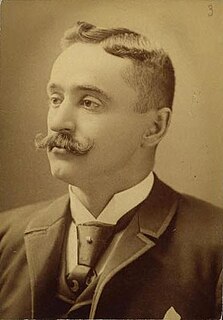
The Baltimore Orioles were a 19th-century Major League Baseball team that played in Baltimore, Maryland. They played in the American Association when it was considered a major league from 1882 through 1891 and in the National League from 1892 through 1899. [1] During their history, the 19th century Baltimore Orioles employed six managers. [2] The duties of the team manager include team strategy and leadership on and off the field. [3] [4]

Major League Baseball (MLB) is a professional baseball organization and the oldest of the major professional sports leagues in the United States and Canada. A total of 30 teams play in the National League (NL) and American League (AL), with 15 teams in each league. The NL and AL were formed as separate legal entities in 1876 and 1901, respectively. After cooperating but remaining legally separate entities beginning in 1903, the leagues merged into a single organization led by the Commissioner of Baseball in 2000. The organization also oversees Minor League Baseball, which comprises 256 teams affiliated with the major league clubs. With the World Baseball Softball Confederation, MLB manages the international World Baseball Classic tournament.
The American Association (AA) was a professional baseball league that existed for 10 seasons from 1882 to 1891. Together with the National League (NL), founded in 1876, the AA participated in an early version of the World Series seven times versus the champion of the NL in an interleague championship playoff tournament. At the end of its run, several AA franchises joined the NL. After 1891, the NL existed alone, with each season's champions being awarded the prized Temple Cup (1894-1897).

The National League of Professional Baseball Clubs, known simply as the National League (NL), is the older of two leagues constituting Major League Baseball (MLB) in the United States and Canada, and the world's oldest current professional team sports league. Founded on February 2, 1876, to replace the National Association of Professional Base Ball Players (NAPBBP) of 1871–1875, the NL is sometimes called the Senior Circuit, in contrast to MLB's other league, the American League, which was founded 25 years later and is called the "Junior Circuit."
Contents
The Orioles first manager was their shortstop, Henry Myers. [2] Myers managed the team for only one season, 1882, and led them to a record of 19 wins and 54 losses, for a winning percentage of .260. [2] [5] In 1883, Myers was replaced by Billy Barnie, who managed the team throughout the remainder of its time in the American Association, through 1891. [1] [2] Barnie managed the Orioles to a record of 470 wins and 548 lossess, for a .462 winning percentage. [2] [6] The 1050 games Barnie managed were the most in Orioles' history, and the 548 games he lost were also the most in Orioles' history. [2]

Shortstop, abbreviated SS, is the baseball or softball fielding position between second and third base, which is considered to be among the most demanding defensive positions. Historically the position was assigned to defensive specialists who were typically poor at batting and were often placed at the bottom of the batting order. Today shortstops are often able to hit well and many are placed at the top of the lineup. In the numbering system used by scorers to record defensive plays, the shortstop is assigned the number 6.
Henry C. Myers was an American Major League Baseball player from Philadelphia, Pennsylvania, who played mainly at shortstop for three seasons from 1881 to 1884.
In sports, a winning percentage is the fraction of games or matches a team or individual has won. It is defined as wins divided by the total number of matches played. A draw counts as a 1⁄2 win.
In 1892, the Orioles joined the National League and outfielder George Van Haltren became the team's manager. [1] Van Haltren lasted only eleven games as manager, winning just one. [2] Van Haltren's winning percentage of .091 is the lowest in Orioles' history. [2] He was by John Waltz, who won just two of the eight games he managed. [2] [7] The third manager the Orioles employed in 1892 was outfielder Ned Hanlon. [2] [8] Hanlon managed the team through the 1898 season, leading the Orioles to three consecutive National League pennants in 1894, 1895 and 1896. [8] In all, Hanlon managed the team for 946 games, winning 555, the most in Orioles history. [2] [8] His .601 winning percentage is also the highest of any Orioles manager. [2]

An outfielder is a person playing in one of the three defensive positions in baseball or softball, farthest from the batter. These defenders are the left fielder, the center fielder, and the right fielder. As an outfielder, their duty is to catch fly balls and/ ground balls then to return them to the infield for the out or before the runner advances, if there is any runners on the bases. As an outfielder, they normally play behind the six players located in the field. By convention, each of the nine defensive positions in baseball is numbered. The outfield positions are 7, 8 and 9. These numbers are shorthand designations useful in baseball scorekeeping and are not necessarily the same as the squad numbers worn on player uniforms.

George Edward Martin Van Haltren was an American center fielder in Major League Baseball. In his 17-year career, lasting from 1887 through 1903, he played for the Chicago White Stockings, Brooklyn Ward's Wonders, Baltimore Orioles, Pittsburgh Pirates, and New York Giants. He also served as player-manager of the Orioles in 1892. Van Haltren recorded 2,544 career hits and a batting average of .316.
John William Waltz was a Major League Baseball manager and executive. He managed the 19th century Baltimore Orioles in 1892. He managed the team for eight games, winning two and losing six. He managed his first game April 29, 1892, after replacing George Van Haltren. He managed his last game May 8, 1892, after which he was replaced by Ned Hanlon.
In 1899, Hanlon became the manager of the Brooklyn Superbas, and third baseman John McGraw replaced him. [2] [8] McGraw managed the team to a 4th-place finish in 1899 with a record of 86 wins and 62 losses, after which the team was disbanded. [1] [9] Both McGraw and Hanlon were eventually elected to the Baseball Hall of Fame. [10]

A third baseman, abbreviated 3B, is the player in baseball whose responsibility is to defend the area nearest to third base — the third of four bases a baserunner must touch in succession to score a run. In the scoring system used to record defensive plays, the third baseman is assigned the number '5'.

John Joseph McGraw, nicknamed "Little Napoleon" and "Mugsy", was a Major League Baseball (MLB) player and manager of the New York Giants. He stood 5 feet 7 inches (1.70 m) tall and weighed 155 pounds (70 kg). He was elected to the Baseball Hall of Fame in 1937. While primarily a third baseman throughout his career, he also played shortstop and the outfield in the major leagues.

The National Baseball Hall of Fame and Museum is an American history museum and hall of fame, located in Cooperstown, New York, and operated by private interests. It serves as the central point for the study of the history of baseball in the United States and beyond, displays baseball-related artifacts and exhibits, and honors those who have excelled in playing, managing, and serving the sport. The Hall's motto is "Preserving History, Honoring Excellence, Connecting Generations." The word Cooperstown is often used as shorthand for the National Baseball Hall of Fame and Museum, similar to "Canton" for the Pro Football Hall of Fame in Canton, Ohio.






